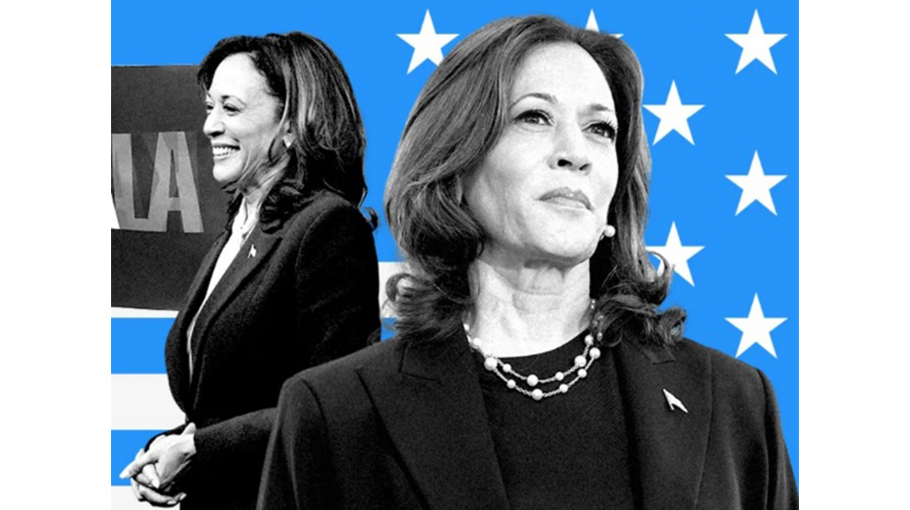Long-doubted by Democrats, Kamala faces her biggest political moment

When Kamala Harris steps onto the stage at the Democratic National Convention in Chicago this week as the party’s presidential nominee, she’ll do so knowing that many in the audience cheering her on once counted her out.
Ms Harris, 59, has faced years of doubt from some within her party about her ability to run for America’s highest political office - including from President Joe Biden, the man whom she continues to serve as vice-president.
Since replacing Mr Biden as Democratic nominee in mid-July, Ms Harris has seen a tidal wave of enthusiasm - reflected in polling, fundraising and the enormous crowds that have come out to see her at rallies across the country.
But the political momentum and energy she has generated in recent weeks among Democrats was never a given.
After failing in a short-lived presidential bid in 2019, she began her vice-presidency on a shaky footing, beset by stumbles in high-profile interviews, staff turnover and low approval ratings. And for the last three-and-a-half years in the White House she has struggled to break through to American voters.
Advisers and allies say that in the years since those early struggles she has sharpened her political skills, created loyal coalitions within her party and built credibility on issues like abortion rights that energise the Democratic base. She has, in other words, been preparing for a moment exactly like this one.
On Thursday, as she formally accepts the Democratic nomination, Ms Harris has an opportunity to reintroduce herself on the national stage with fewer than 80 days until an election that could see her become the nation’s first female president.
At the same time, she’ll have to prove that she is capable of leading a party that never saw her as its natural leader and remains divided over the war in Israel and Gaza.
But above all, she’ll need put to rest any lingering doubt among the Democratic faithful that she can meet the challenge of defeating former president Donald Trump in what remains a tight and unpredictable contest.
Path to the White House
Before Kamala Harris became a national figure, the former San Francisco district attorney and California attorney general had forged a reputation as a rising star in the party, landing the endorsement of President Barack Obama in her 2010 race to become the state’s top lawyer.
But those who followed her career closely saw a mixed record. As a prosecutor, she faced public outcry for refusing to seek the death penalty for a man convicted of killing a young police officer. And then as attorney-general, she upheld the state’s death penalty despite her personal opposition.
Having reached the peaks of California state politics, she was elected to the US Senate the same night that Donald Trump defeated Hillary Clinton in the 2016 presidential election. In her brief tenure, she made headlines for her searing and direct questioning of Supreme Court Justice Brett Kavanaugh during his testy 2018 confirmation hearings.
“Can you think of any laws that give government the power to make decisions about the male body?” she asked the Trump appointee, in an exchange that cascaded across social media and late night television.
Like Mr Obama, she was a young senator of limitless ambition. Halfway through her first term, she launched a presidential campaign.
That campaign, like this one, was met with great fanfare. More than 20,000 people gathered in her hometown of Oakland, California, for its launch. But her effort to become the Democratic nominee sputtered and collapsed before the first presidential primary ballot was even cast.
Ms Harris failed to carve out a clear political identity and distinguish herself in a field of rivals that included Mr Biden and left-wing senator Bernie Sanders. Critics said she endorsed a range of progressive policies but seemed to lack clear conviction.
A breakthrough June 2019 debate moment in which she challenged her then-opponent Mr Biden’s record on the racial desegregation of schools resulted in a brief surge in polling. She attacked Mr Biden for an earlier campaign moment in which he fondly recalled working with two segregationist senators, before accusing him of opposing the bussing of students between schools to help integrate them.
“There was a little girl in California who was part of the second class to integrate her public schools, and she was bussed to school every day,” Ms Harris said. “And that little girl was me.”
But campaign infighting and indecision on which issues to emphasise ultimately sank her presidential bid.
The campaign was marked by “a lot of rookie mistakes”, said Kevin Madden, an adviser on Republican Mitt Romney’s 2008 and 2012 presidential campaigns. “The substance that needed to be there to pass the commander-in-chief test and to really fill in some of the blanks for voters, it just wasn’t there and as a result her opponents filled it in for her.”
Eight months later, Mr Biden put aside their primary rivalry and announced Ms Harris as his running mate. She became the first woman of colour to ever be nominated in that position - and in January 2021, the first female vice-president in US history.




